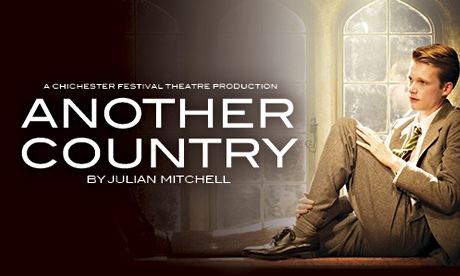“Another Country”– just a snapshot of a moment in time or are there lessons for us today?

Julian Mitchell’s “Another Country” was first produced in 1981 and looked back half a century to the Britain of 1933 in which era it was set. The latest revival – a Chichester Theatre production – looks back in a way both to the 1980s and to the 1930s. The play was well received in 1981 when social liberalism had only quite recently won but when there was an uneasiness not helped by what some saw as reaction in Margaret Thatcher's first administration. The “other country” of 1933 was idealistic but deeply scarred by the Great War and by the confusions of class and power that characterised the 1930s. The times were hedonistic and conventional values – both political and moral - were being challenged both by young adults and by those who had survived War and celebrated. But there was still plenty of denial, hypocrisy and censorship. Noel Coward’s Design for Living with its theme of bisexuality and a ménage à trois, had to be premiered in New York in 1932 because Coward knew that it would not survive the censor in London. So homosexuality was not only a crime but never openly spoken about in “polite society”.
“Another Country” has homosexuality as its key motif. The location is an English Public School, single sex of course as they nearly all were at that time. A distinction is made between casual sexual behaviour, which nearly all the boys seemed to indulge in, and the passions of “Guy Bennett” who realised beyond doubt that he was “Queer” – and that was that. This could be fatal – as we see when it is revealed early in the play that a boy has hanged himself because he has been discovered in flagrante with another boy. This is a chilling reminder of just how dangerous being different could be. Judd, another part of the same school set, is different as well – he is the political idealist who sees the communism of the Soviet Union as the model. This is a play about conformity, the school or house ethic and how it must be followed and how those who choose not to must be punished.
In this new production “Another Country” is performed as rather a clunking metaphor. Society whether in be in 2014, or 1981 or 1933 has its elements of arbitrary behavioural norms and woe betide those who do not follow them. We are more liberal today but does that mean we are more tolerant – not necessarily ! And the fact that the Bullingdon Club at Oxford and the “Pop” at Eton still exist shows that male privilege hasn't declined much either (the “22” Club in “Another Country” is clearly based on “Pop”).
My Father was at an English Public School in 1933 and I went to the same one in the 1960s. My father would recognise the world he was part of in this play - as do I. Can we learn much about modern Britain from this revival or is it just a historical oddity of a time past? I think that Alan Bennett's “The History Boys” which also (partly) has a homosexual theme covers the subject far better without trying to create a fictional society that is a metaphor for something else. To look back at how in the 1980s we saw the 1930s has its value perhaps – though there is a risk that we will smugly say that it is all so much better now! The 1930s and 1940s was a time of betrayal by some and persecution of others by the establishment. The Cambridge spies emerged from the world of “Another Country” as did the ghastly persecution, and suicide, of Alan Turing and others.
My own view – and I differ with the critics on this I think – is that there is not much to say for this revival. It is adequately staged and performed and there are some decent performances – especially from Rob Callender as Guy Bennett. But does it do more than slightly shock and entertain us? I'm not sure that it does. And do we really care much about any of the characters? I don't think so.